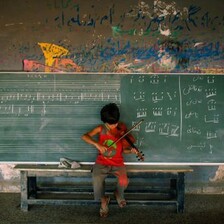The Electronic Intifada 23 March 2010
Like stones thrown from the palms of Palestinian youth, Rafeef Ziadah’s lyrics are relentless in the way they shower audiences with the multiple layers of resistance and diaspora. Ziadah’s debut album, Hadeel, unleashes a tapestry of fierce poetry infused with an eclectic selection of beautiful sounds.
From oud (the traditional stringed instrument) to minimalist beats, a variety of Toronto-based musicians paint a lush musical scene for Ziadah to decorate with her explicit expose of racism, sexism and greed. In a matter of 12 tracks, Ziadah takes the listener on an intense journey through her life and experiences as a Palestinian refugee.
The album kicks off with “All Shades of Anger,” a track that celebrates the spirit of resistance in Arab women against misogyny and bigotry. In Arabic, Ziadah takes a defiant stand of articulate lyricism that dismantles the variety of ways in which Arab women are dehumanized by Israeli ethnic cleansing.
“Allow me to speak my Arab tongue before they occupy my language as well,” Ziadah utters to a funky bass line accentuated by the percussion knocking that immediately grabs the listener.
The opening track has become an anthem for marginalized Palestinian youth fighting against Israeli apartheid. Live performances of the piece are usually accompanied by a chorus of followers, who know each word and each poetic enunciation. “All Shades of Anger” will undoubtedly a stay with the listener long after the headphones come off.
Similarly, the second track, “Baghdad,” lifts the curtain on another point of powerful struggle. Named after the Iraqi capital that has stood in the face of tremendous violence, a tabla drum and oud carry poetry like “Let Jenin, Sabra, and Tel al-Zaatar hold you.” Ziadah makes clear that from Palestine to Iraq, it is the same fire that unites the two peoples under occupation.
By the time Ziadah takes the chains off the third track, “Breathe,” the listener is ready, and willing, to fall apart. “Breathe” describes a mother dying under the intensity of losing a homeland and an identity. Like a dream breaking through the limitations of consciousness, a violin floats on the pattering touches of a hand drum while carefully sculpted poetry sets the mind on fire: “Like Palestine, she screams deep in the sand,” Ziadah sings.
The first third of the album wraps up by reaching beyond the geographical confines of the Palestinian struggle. “Supposed To” is delivered in the voice of a domestic worker, forced into diaspora and servitude by poverty. The subjugation of South Asian women in the Arab world is a common occurrence. Ziadah sheds a light on the same class structures that determine the fate of impoverished peoples around the world through her poetry.
The remaining eight tracks are nestled between that space where the mind wants to escape the onslaught of reality and where the heart is completely overcome by Ziadah’s words. From “Cry,” where the listener is serenaded by the woes of a broken daughter describing the struggle of a resilient mother, to “Hadeel,” the title track which is dedicated to a child of the same name murdered by the Israeli military in Gaza. The album only grows in its intensity and devastating beauty.
Over time, the ability of societies to organize themselves against oppression has always been bolstered by the creation of an accompanying cultural space. A vibrant artistic movement writes narratives of struggle in more accessible and relevant ways than other forms of discourses. This is particularly true for the growing campaign for boycott, divestment and sanctions against Israeli apartheid.
Rafeef Ziadah’s Hadeel is an inspiring addition to a group of artists who are lending their voices to the fight against racism. Not only are a greater number of filmmakers and musicians producing work that speaks about Palestine, but a creative bulk is emerging to boycott Israeli cultural institutions. Ziadah’s debut work is not only an eloquent ode to Palestine, but is a powerful tool in the movement to dismantle Israeli apartheid.
Ahmed Habib is a Toronto-based Iraqi journalist and poet, living too far away from Baghdad. He can be reached at shakomako A T gmail D O T com.
Related Links



